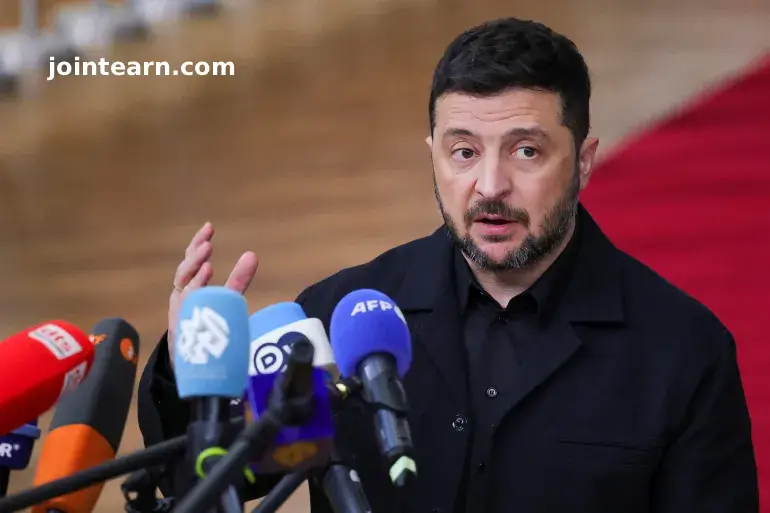
European Union leaders are set to make a groundbreaking decision to use frozen Russian assets to provide financial support to Ukraine, with discussions taking place at a summit in Brussels. The proposed €140 billion ($163.27 billion) loan aims to fund Ukraine’s military and reconstruction needs for 2026 and 2027, drawing sharp criticism from Moscow.
EU Summit Welcomes Zelenskyy
European Council President Antonio Costa welcomed Ukrainian President Volodymyr Zelenskyy to the summit as a “future member” of the bloc. Costa confirmed that a political decision on the allocation of frozen Russian central bank assets would be made during the meeting, aimed at covering Kyiv’s funding requirements.
Several EU leaders expressed broad support:
- Sweden’s PM Ulf Kristersson indicated “broad support” for the measure.
- Finland’s PM Petteri Orpo urged the European Commission to propose a concrete mechanism so funds could be available early next year.
However, Belgium, which houses the largest tranche of frozen Russian assets through the Euroclear securities depository, expressed legal concerns. Belgian Prime Minister Bart De Wever emphasized that the EU could not proceed without meeting Belgium’s legal guarantees.
German Chancellor Friedrich Merz assured that progress would be made, while EU Foreign Policy Chief Kaja Kallas confirmed that a mechanism would be established to address Belgium’s legal concerns and share the risks associated with using Russian assets.
Loan Allocation and Arms Purchases
A key point of negotiation revolves around how Ukraine may spend the funds. Some EU members, including Germany, France, and Italy, proposed that the money should be directed toward European arms manufacturers, ensuring benefits for both Ukraine and the EU defense industry.
Kyiv, however, demands autonomy over how the loan is spent, emphasizing the need for flexibility to procure weapons and equipment as required to sustain its defense against Russia.
Moscow Reacts Furiously
The Russian Foreign Ministry condemned the move, labeling the seizure of frozen assets as “illegal” and a form of theft. Spokeswoman Maria Zakharova warned of a “painful response” and reiterated that Russia’s war objectives in Ukraine remain unchanged.
Former Russian President Dmitry Medvedev described the EU-US sanctions as an “act of war,” criticizing US President Donald Trump for aligning with European measures.
Alignment on New Sanctions
During the summit, Zelenskyy welcomed new US and EU sanctions targeting Russian energy, financial, and trade sectors. The EU’s 19th sanctions package includes:
- Restrictions on Russian banks, crypto exchanges, and entities in India and China.
- Blacklisting Russian tankers in the “shadow fleet” used to circumvent export limits.
- New restrictions on Russian diplomats traveling in Europe.
- Phase-out of Russian liquefied natural gas (LNG) imports.
Trump recently imposed sanctions on Russian oil giants Lukoil and Rosneft, the first since his return to office. Indian oil refiners are expected to reduce imports significantly, while Trump plans to discuss China’s purchases of Russian oil during the APEC summit.
Ukraine Rejects Territorial Concessions
The Brussels summit comes after US-EU discussions regarding Ukraine’s territorial stance. Zelenskyy and European leaders rejected any demands for Ukraine to surrender captured land to Russia in exchange for peace. Zelenskyy emphasized that a ceasefire is possible only if pressure on Moscow continues, ruling out territorial concessions.
Preparing for European Defense
European leaders are also developing a roadmap to enhance Europe’s defenses against potential Russian aggression. The UK will host a meeting of the “coalition of the willing” comprising over 30 nations to coordinate military support for Ukraine, with Zelenskyy in attendance.
Key Takeaways
- EU leaders are poised to use €140 billion of frozen Russian assets to support Ukraine.
- The move faces legal and political hurdles, especially from Belgium.
- New US and EU sanctions target Russian energy, financial sectors, and trade networks.
- Zelenskyy rules out territorial concessions and calls for continued pressure on Russia.
- European nations plan to strengthen defense and arms coordination for the long term.


Leave a Reply